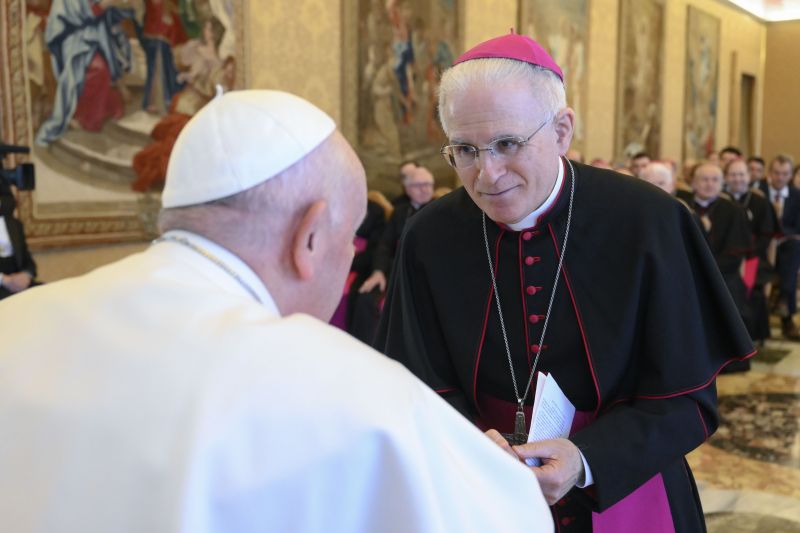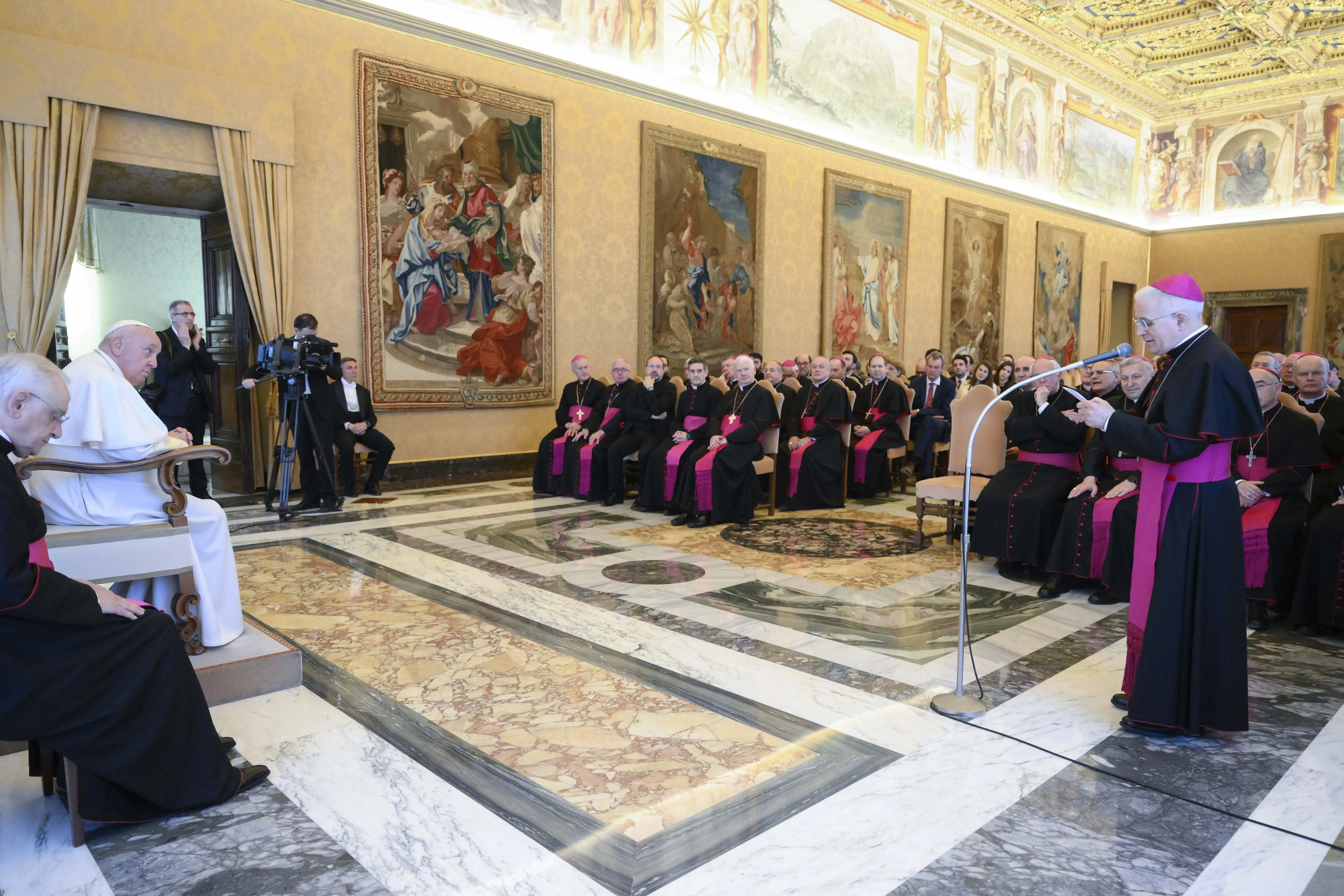Meet the new president of the European bishops’ commission
Bishop Mariano Crociata meets with Pope Francis on March 23, 2023. / Credit: Vatican Media Rome Newsroom, Mar 30, 2023 / 11:30 am (CNA). Last week the European bishops elected the new president of their commission, Italian Bishop Mariano Crociata.Crociata, who leads the Catholic Diocese of Latina in the Lazio region of Italy, succeeds Cardinal Jean-Claude Hollerich.The bishop delegates of the dioceses of the European Union elected Crociata in a March 22 vote during their spring plenary assembly.Crociata, 70, will lead the Commission of the Bishops’ Conferences of the European Union (COMECE) until 2028. He is supported by four vice presidents.“This is a crucial time for Europe and for the Church. Unity and solidarity are needed more than ever. They should guide us through the many transitions our societies are faced with,” Crociata said in a statement after his election.Crociata told EWTN News after his election that he was feeling a little intimidated by the new responsibility.“We are diocesan bishops ... and here a certain level of responsibility and institutional attention is required,” he said.The bishop added that his experience as vice president of the commission over the past five years has given him more confidence for the new role, however, together with “the really collegial nature of great partnerships, the support of the general secretariat, and of many experts.”Crociata said Pope Francis is very attentive to the issues facing the European Union today, and in a meeting with COMECE on March 23 the pope invited the bishops “to center all our efforts around the theme of the unity of Europe and the search for peace.”Pope Francis meets with members of the Commission of the Bishops’ Conferences of the European Union (COMECE) on March 23, 2023. The pope invited the bishops “to center all our efforts around the theme of the unity of Europe and the search for peace.”. Credit: Vatican MediaThe Italian bishop was born in the town of Castelvetrano in Italy’s southernmost region, the island of Sicily.He was ordained a priest in 1979 at the age of 26 after studying philosophy and theology at the Pontifical Gregorian University in Rome, where he received a doctorate in theology.After his first 24 years as a priest, he was nominated vicar general of the Diocese of Mazara del Vallo and diocesan director of Catholic Action. He was also a fundamental theology teacher at the Pontifical Theology Faculty of Sicily.He was also a theology and Christology professor at the Institute of Religious Sciences of Mazara del Vallo and an expert on interreligious dialogue.In 2007, Crociata was named bishop of Noto, a diocese in Sicily. The following year he was appointed secretary general of the Italian bishops’ conference for a five-year period, thus concluding his term as bishop of Noto.He was named bishop of Latina-Terracina-Sezze-Priverno on Italy’s mainland in 2013.Prior to being elected president of the European bishops’ commission, Crociata was first vice president for five years. He has been the Italian delegate since 2017.COMECE is made up of bishops delegated by the bishops’ conferences of the 27 member states of the European Union.The commission’s leadership has released statements in support of Catholic values in Europe, particularly against abortion and for the protection of persecuted Christians in other countries.

 Bishop Mariano Crociata meets with Pope Francis on March 23, 2023. / Credit: Vatican Media
Bishop Mariano Crociata meets with Pope Francis on March 23, 2023. / Credit: Vatican Media
Rome Newsroom, Mar 30, 2023 / 11:30 am (CNA).
Last week the European bishops elected the new president of their commission, Italian Bishop Mariano Crociata.
Crociata, who leads the Catholic Diocese of Latina in the Lazio region of Italy, succeeds Cardinal Jean-Claude Hollerich.
The bishop delegates of the dioceses of the European Union elected Crociata in a March 22 vote during their spring plenary assembly.
Crociata, 70, will lead the Commission of the Bishops’ Conferences of the European Union (COMECE) until 2028. He is supported by four vice presidents.
“This is a crucial time for Europe and for the Church. Unity and solidarity are needed more than ever. They should guide us through the many transitions our societies are faced with,” Crociata said in a statement after his election.
Crociata told EWTN News after his election that he was feeling a little intimidated by the new responsibility.
“We are diocesan bishops ... and here a certain level of responsibility and institutional attention is required,” he said.
The bishop added that his experience as vice president of the commission over the past five years has given him more confidence for the new role, however, together with “the really collegial nature of great partnerships, the support of the general secretariat, and of many experts.”
Crociata said Pope Francis is very attentive to the issues facing the European Union today, and in a meeting with COMECE on March 23 the pope invited the bishops “to center all our efforts around the theme of the unity of Europe and the search for peace.”

The Italian bishop was born in the town of Castelvetrano in Italy’s southernmost region, the island of Sicily.
He was ordained a priest in 1979 at the age of 26 after studying philosophy and theology at the Pontifical Gregorian University in Rome, where he received a doctorate in theology.
After his first 24 years as a priest, he was nominated vicar general of the Diocese of Mazara del Vallo and diocesan director of Catholic Action. He was also a fundamental theology teacher at the Pontifical Theology Faculty of Sicily.
He was also a theology and Christology professor at the Institute of Religious Sciences of Mazara del Vallo and an expert on interreligious dialogue.
In 2007, Crociata was named bishop of Noto, a diocese in Sicily. The following year he was appointed secretary general of the Italian bishops’ conference for a five-year period, thus concluding his term as bishop of Noto.
He was named bishop of Latina-Terracina-Sezze-Priverno on Italy’s mainland in 2013.
Prior to being elected president of the European bishops’ commission, Crociata was first vice president for five years. He has been the Italian delegate since 2017.
COMECE is made up of bishops delegated by the bishops’ conferences of the 27 member states of the European Union.
The commission’s leadership has released statements in support of Catholic values in Europe, particularly against abortion and for the protection of persecuted Christians in other countries.














